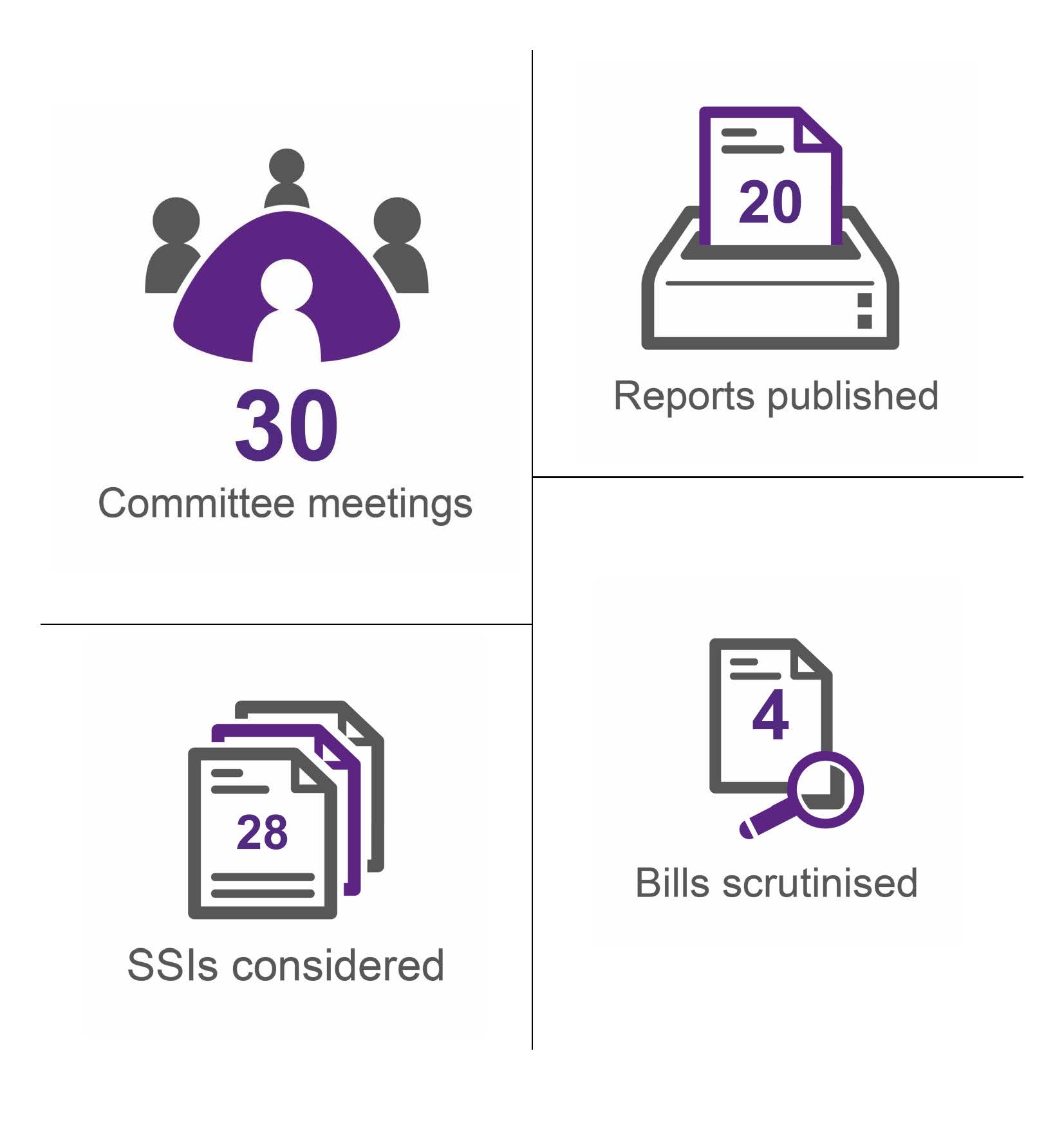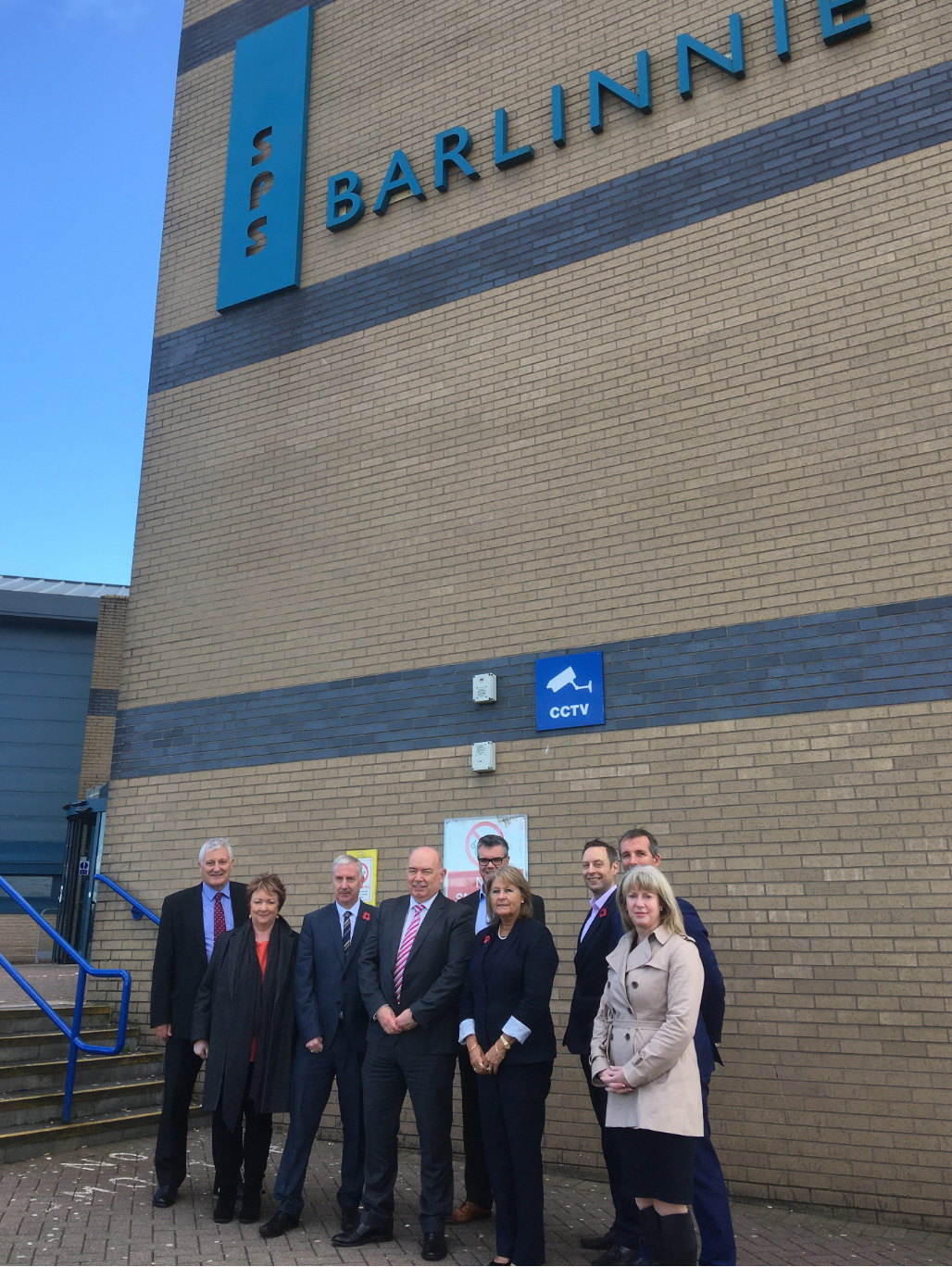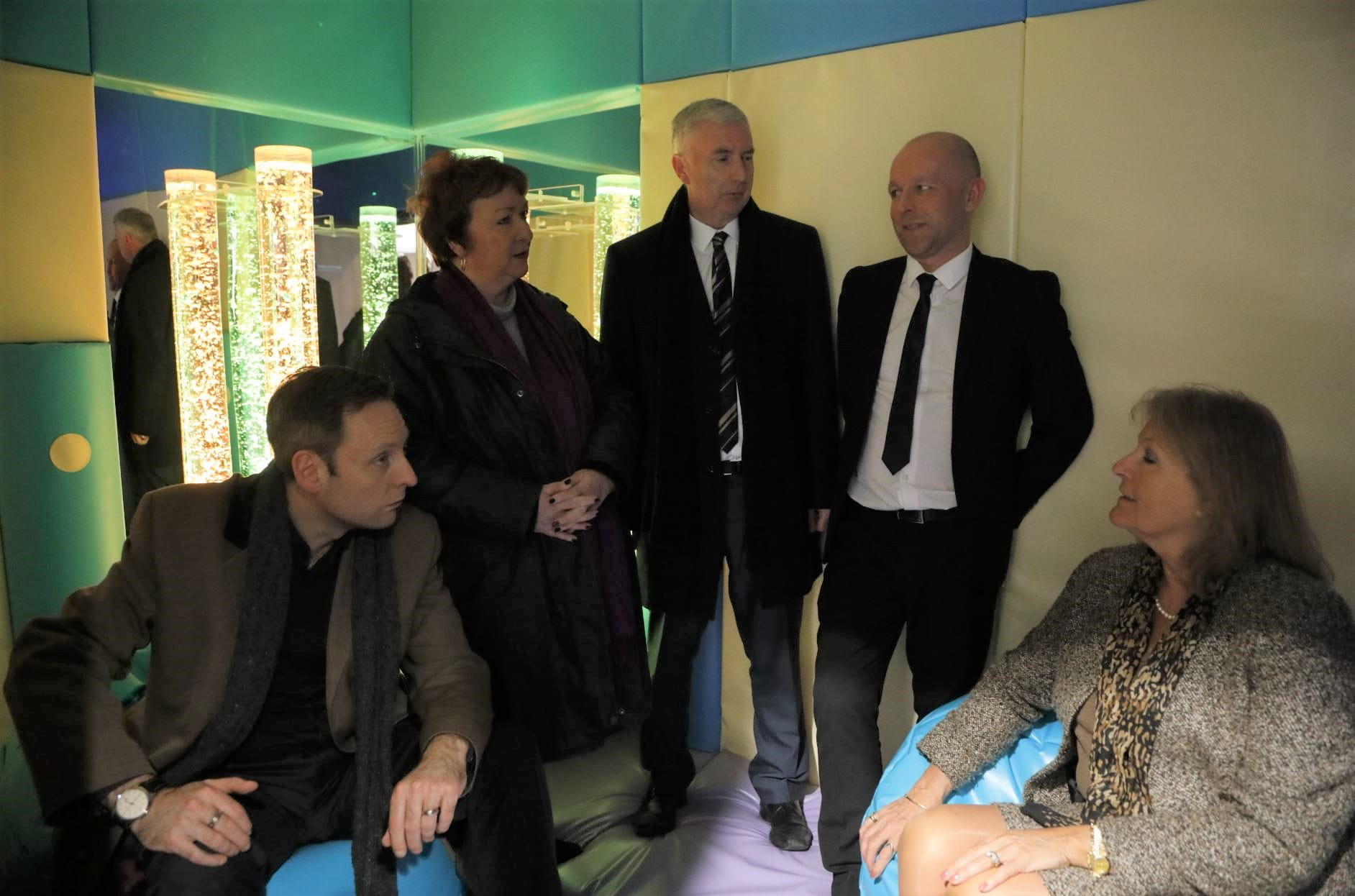Justice Committee
Justice Committee Annual Report 2019-20
Introduction
This report outlines the work of the Justice Committee ("the Committee") and the Justice Sub-Committee on Policing ("the Sub-Committee") during the Parliamentary year from 12 May 2019 to 11 May 2020.

Membership changes
Previous members of the Justice Committee during the reporting year—
Jenny Gilruth (from 19 April 2018 to 19 February 2020); and
Daniel Johnson (from 9 January 2018 to 8 September 2019).
Meetings
The Committee held 30 meetings over this period. One meeting was held entirely in private and 25 meetings partly in private. Most items taken in private were to consider draft reports or the Committee's work programme. 29 meetings were held in Edinburgh and one meeting was held virtually (due to the Covid-19 public health emergency).
Witnesses
This year, of 116 witness appearances before the Committee, 47% were male and 53% were female.
Legislation
Scottish Biometric Commissioner Bill
The Scottish Biometrics Commissioner Bill was introduced in to the Parliament by the Cabinet Secretary for Justice, Humza Yousaf MSP, on 30 May 2019, and was referred to the Committee for scrutiny. The policy objective of the Bill was to address ethical and human rights issues raised by the changing use of biometric data and technologies. The objective being to allow the use of biometric data to keep communities safe, while respecting the rights of the individual and ensuring the police are held accountable for the use of such data.
The Bill establishes the independent Office of Scottish Biometrics Commissioner which will be accountable to the Parliament. It also defines biometric data in Scots law. This addressed both ‘first-generation biometrics’ like fingerprints, DNA and custody photographs etc. and newer ‘second-generation biometrics’ like data from facial recognition software, remote iris recognition or other behavioural biometrics like voice pattern analysis. The main role of the new Commissioner will be to create and enforce a Code of Practice on how biometric data is acquired, kept, used and destroyed for criminal justice and policing purposes in Scotland.
The Committee published its Stage 1 Report in December 2019. The Scottish Government responded in January 2020.
Following the Committee’s Stage 1 scrutiny, various amendments were proposed to the Bill and accepted by the Parliament. These strengthened the powers of the Commissioner and future-proofed the role. As a result, the Bill embeds the principles of ethics and human rights at the heart of how biometric technology is used and regulated in the criminal justice system in Scotland. While the powers of the Commissioner currently only extend to the areas of biometrics in criminal justice and policing purposes, the finalised Bill recognises the need for future regulation of technology across all areas of public life, such as in health and education. The Bill was passed by the Parliament on 10 March 2020.
Children (Scotland) Bill
Sometimes parents end up in dispute with each other over their children, for example when the parents are separating or divorcing. Part 1 of the Children (Scotland) Act 1995 contains the law which applies to resolve these disputes. The Children (Scotland) Bill ("the Bill") substantially amends the 1995 Act, as well as making some changes to other legislation affecting children. According to the Scottish Government, the policy aims of the Bill are to:
ensure the views of the child are heard in contact and residence cases;
further protect victims of domestic abuse and their children;
ensure the best interests of the child are at the centre of contact and residence cases and children's hearings; and
further compliance with the United Nations Convention on the Rights of the Child (UNCRC) in family court cases.
The Bill was referred to the Justice Committee for Stage 1 scrutiny and the Committee issued a call for evidence on 20 September 2019, with a closing date of 15 November 2019. The Committee received 75 responses to its call for evidence and 12 supplementary responses during its Stage 1 scrutiny of the Bill. All written submissions can be found here.
The Committee published its Stage 1 Report on 1 May 2020. The Bill passed Stage 1 unanimously on 27 May.
Defamation and Malicious (Publications) Scotland Bill
The Defamation and Malicious (Publications) Scotland Bill is a Scottish Government Bill. The Bill aims to modernise and simplify the law of defamation and of verbal injury. It implements recommendations in the Scottish Law Commission’s report on defamation.
The Committee published a call for evidence on Friday 17 January 2020. The call for views closed on Friday 13 March 2020. A first evidence session with the Scottish Government’s Bill Team has been held.
As a result of the Covid-19 pandemic, the Committee has not completed any further evidence sessions. These are expected to restart in the Autumn.
Hate Crime and Public Order (Scotland) Bill
The Hate Crime and Public Order (Scotland) Bill is a Scottish Government Bill. The Bill has three main aims. It updates and consolidates existing laws in this area. It also adds to the groups currently specifically protected by hate crime laws. Criminal courts can generally take into account any prejudice when sentencing a person. Also, people are protected from hate crime through specific laws that apply.
The Committee published a call for evidence on Monday 4 May 2020. The closing date for receipt of written submissions is Friday 24 July 2020. No evidence at Stage 1 is expected until the Autumn.
Subordinate legislation
During the parliamentary year the Committee considered 28 Scottish Statutory Instruments, 14 of which were affirmative instruments and 14 were negative instruments.
Other scrutiny work
Secure care places for children and young people in Scotland
In April 2019 the Justice Committee agreed to undertake a short inquiry to look at key issues relating to the provision of mental health services and secure care places for children and young people in Scotland. Currently, five units provide secure care provision, on a contract basis, to Scotland’s 32 local authorities. This contract is managed by Scotland Excel.
The inquiry included looking at the current and future capacity and structure of the secure care system in Scotland. It also touched upon the care of young people imprisoned in HMP YOI Polmont, following the deaths in custody there of Katie Allan (21) in June 2018 and William Brown (16), also known as William Lindsay, in October 2018. According to press reports, there were 11 deaths of young people in YOI Polmont between 2005 and 2018.
Between May and September 2019, the Committee took written and oral evidence from various key stakeholders. These including HM Chief Inspector of Prisons for Scotland, a consultant forensic child and adolescent psychiatrist, a local authority health and social care partnership; the Centre for Youth and Criminal Justice, and Barnardo’s Scotland and the Office of the Children and Young People’s Commissioner Scotland.
The Committee also heard from the leaders of the four secure care units, the local authority representative body COSLA, the leadership of Scotland Excel, and the senior management of the Scottish Prison Service.
The Committee published a report of its findings and recommendations on 26 November 2019. Amongst its key recommendations were-
calling for an assessment of all young persons’ needs to be made within the first days of their incarceration, and consistent, high-quality physical, educational and mental health support to be provided thereafter;
identifying that over 60% of young people who offend in Scotland have significant speech, language and communication needs, and significant numbers also self-harm or have attempted suicide;
highlighting the ‘postcode lottery’ in the provision of child and adolescent mental health support, particularly in secure care units located outside the greater Glasgow area;
calling for more flexibility to be introduced into the system to allow a young person the possibility of remaining in a secure care unit beyond their 18th birthday, if this was found to be in their best interests, and
calling for a rethink of the current funding model for the provision of secure care in Scotland, with models such as block-funding or a national commissioning process being considered to ensure secure care units spend more time and effort focusing on helping those in their care, and less time on their own financial sustainability.
All of the Committee’s findings and recommendations are contained in its report.
The Scottish Government provided a written response to the Committee’s findings on 28 January 2020.
Pre-Budget Scrutiny of the Scottish Government's Draft Budget 2020-21
During September to December 2019, the Committee conducted pre-budget scrutiny of the Scottish Government’s then Draft Budget for 2019/20. The focus was on views relating to budgets for prisons and prison-related health, education, employment and through-care programmes as part of this year’s scrutiny.
The Committee published its Report on 1 December 2019 with the Scottish Government responding on 6 February 2020.
Covid-19
Since the Scottish Parliament entered lockdown in mid-March, the Committee has been conducting a range of scrutiny through one-off evidence sessions and by correspondence. Details can be found on the Committee’s Covid-19 page.
Subjects have included the impact of the virus on prisons, policing, fire and rescue and the civil and criminal justice systems.
Brexit
In our preceding Annual Report for 2018/19. we reported that the Committee had published a major report on the impact of Brexit on the civil and criminal justice systems and policing in Scotland. The Scottish Government responded in August 2019. The Committee continues to keep the discussions on a new agreement between the UK and EU under review.
The Committee has also been considering a number of statutory instruments relating to the UK's withdrawal as a member state of the EU. Now that the UK is no longer a member state, there will be some laws and regulations that will no longer apply or work properly. To prepare for this, the UK and Scottish governments have been developing legislation to provide for the UK's new position as a non-EU member. They are also correcting the laws and regulations that will need some changes to ensure they work properly. Our consideration of the laws and regulations relevant to justice and policing can be found online.
Public petitions
During the reporting year the Committee continued consideration of one petition referred to it in a previous year:
PE1458: The Petition was introduced into the Parliament in December 2012 and referred to the Committee by the Public Petitions Committee on 31 May 2018. The petition calls on the Scottish Parliament to urge the Scottish Government to create a Register of Pecuniary Interests of Judges Bill or amend present legislation to require all members of the Judiciary in Scotland to submit their interests and hospitality received to a publicly available Register of Interests. The Committee considered the Petition on 28 May 2019, 19 November 2019 and 10 March 2020. The Committee will give further consideration to the petition in due course.
Equalities, engagement and innovation
Equality issues were central to much of the evidence the Committee took the year. The Justice Committee has achieved a near 50:50 balance in gender balance of its witnesses. The Committee has also been looking at other protected characteristics such as the crimes of abuse against the elderly as part of its initial consideration of the Hate Crime and Public Order (Scotland) Bill.
During our consideration of the Children (Scotland) Bill, the issues and rights of children when giving evidence were covered in depth, including how their voice is listened to in courts.
The Committee has sought to engage with stakeholders in a variety of ways during its work this year, not just formal evidence taking. The Committee has used visits and informal meetings, visits to prisons etc. as ways of speaking to people about the reality of issues on the ground.


Justice Sub-Committee on Policing
The Justice Sub-Committee on Policing, which reviews the operation of the Police and Fire Reform (Scotland) Act 2012 as it relates to policing, held 12 meetings during the reporting period. Two meetings were held wholly in private to consider a draft report, and nine meetings were held partly in private (to discuss the forward work programme and to consider the evidence heard).
Membership changes
Previous Members of the Justice Sub-Committee on Policing during the reporting year—
Jenny Gilruth (from 19 April 2018 to 19 February 2020)
Daniel Johnson (from 9 January 2018 to 8 September 2019)
Stewart Stevenson (from 6 October 2016 – 20 June 2019)
Witnesses
This year, of 26 witness appearances before the Sub-Committee, 81% were male and 19% were female.
Work throughout the year
The Sub-Committee undertook an inquiry into how policing in Scotland makes use of facial recognition technology. The Sub-Committee published its Report on 11 February 2020.
The Sub-Committee took formal evidence on Police Scotland's planned spending and priorities and its draft budget for 2020-21. The Sub-Committee published its Report on 22 November 2019. The Sub-Committee also took formal evidence on planning and resourcing Policing the United Nations Framework Convention on Climate Change 26th Conference of Parties (COP26) climate summit, which had been scheduled for November 2020.
The Sub-Committee also took formal evidence on Police Scotland’s custody provision.
Since the Scottish Parliament entered lockdown in mid-March, the Sub-Committee has been conducting scrutiny of policing during the pandemic. Details can be found on the Sub-Committee’s Covid-19 page.